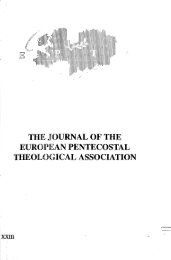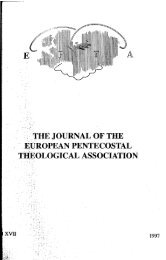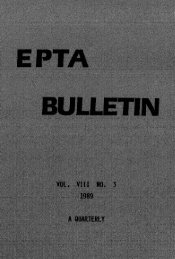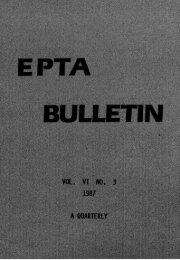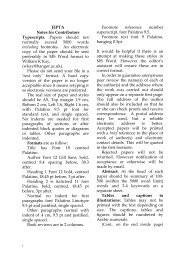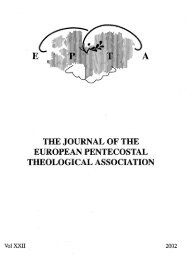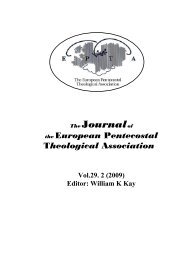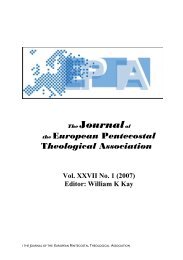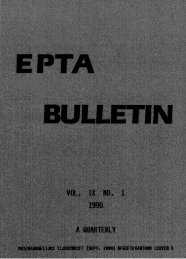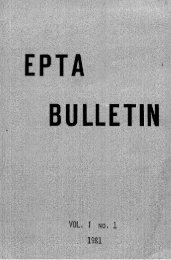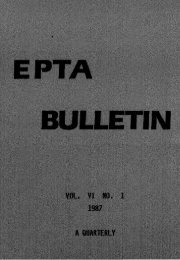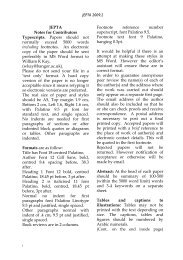jepta 2001 21 - European Pentecostal Theological Association
jepta 2001 21 - European Pentecostal Theological Association
jepta 2001 21 - European Pentecostal Theological Association
You also want an ePaper? Increase the reach of your titles
YUMPU automatically turns print PDFs into web optimized ePapers that Google loves.
The Journal of the <strong>European</strong> <strong>Pentecostal</strong> <strong>Theological</strong> <strong>Association</strong>, Vol. XXI, <strong>2001</strong><br />
Arthur Booth-Clibborn: <strong>Pentecostal</strong> Patriarch: James Robinson<br />
urban planning as advocated by William Penn, the founding father of American<br />
Quakerism.' As a mark of Richardson's Quaker and Temperance sensibilities,<br />
the proud boast of the village was for many years, "No pubs, No pawnbrokers,<br />
No Police". What it did have were a dispensary available at nominal cost to<br />
workers, a community hall with library1 lecture room facilities, a newsroom well<br />
stocked with papers and periodicals and a school where evening adult classes<br />
were held. Richardson was offered a baronetcy by Gladstone as an<br />
acknowledgement of the philanthropic intent behind his social experiment at<br />
Bessbrook, but turned it down. The experiment spurred another Quaker, George<br />
Cadbury, to build the garden village of Bourneville, near Birmingham. These<br />
Quaker and other model settlements provided much of the stimulus for the New<br />
Town movement of post-war Britain.<br />
Arthur's father, John Clibborn, was the co-founder of the linen mills at<br />
Bessbr~ok.~ The Irish roots of the family lay with Colonel John Clibborn, an<br />
officer in Cromwell's army, who became an active Quaker after being impressed<br />
by the message and demeanour of the Friends whose meeting house he was called<br />
upon to raze by fire at Moate, Co.Westmeath in 1657.' Another ancestor was<br />
Robert Barclay (1648-90) whose Apology for the True Christian Divinity (1678)<br />
made him the classic apologist of Quakerism. Coming from a financially<br />
comfortable, background, Arthur was sent at the age of thirteen to France and<br />
Switzerland for a private education and his formal education ended with the<br />
award of an honours degree from Lausanne University. He had a marked<br />
proficiency in languages, mastering five, and he was particularly fluent in French<br />
and German. On his return to Bessbrook, he trained for a period of six years in<br />
the family business. In the course of his training, he learnt the basic skills of<br />
spinning and weaving on the shop floor. On completing his apprenticeship, he<br />
became the manager of the spinning department, employing 800 people, with a<br />
view to his taking up a directorship in due course.<br />
His experiences in the linen mill reinforced his Quaker stance on pacifism as the<br />
following recollection showed:<br />
Had you ever heard, as I have, an unearthly<br />
shriek ring up through five storeys of a huge<br />
factory an eighth of a mile in length, and then<br />
seen the countless revolving wheels slowing<br />
down while, as the hum of thirty thousand<br />
' James Walvin, The Quakers; Money and Morals, John Murray, London (1997) 90.<br />
' Carolyn Scott, The Heavenly Witch: the Stov ofthe Marechale, Hamish Hamilton, London<br />
(1981) 47.<br />
M. J. Wigham, The Jrish Quakers, Historical Committee of the Religious Society of Friends,<br />
Dublin (1 992) 23.<br />
spindles and ten thousand rollers gradually<br />
ceased, the shrieks grew louder against the<br />
growing stillness, and had you gone down, as the<br />
responsible manager, to find a poor boy lying in a<br />
huge heckling machine with his arm caught in up<br />
to the shoulder, the flesh tom off by the countless<br />
revolving needles ...- then you would like to do<br />
just a little to unbolt some of the machinery of<br />
war and set free.. some of the poor mothers' sons<br />
who have been caught in it.'<br />
Through his later association with Dowie, Arthur would have found a certain<br />
resonance between Bessbrook and Zion City, Illinois. Zion City too was a model<br />
settlement, founded on temperance principle^,^ with a strong agenda of religiosocial<br />
experimentation. Both aimed to provide the prototype for a humanely<br />
ordered industrial gemeinschaft. Dowie pursued a broader vision than most other<br />
innovators; it was nothing less than the creation of a theocratic c~rnmunity.~ Zion<br />
was conceived as the perfect Christian city, the forerunner of many Zions actively<br />
engaged in preparing for Christ's return. Both settlements, though differing<br />
considerably in size, presented major innovations in physical planning and each<br />
evoked wide interest among those concerned with schemes for solving societal<br />
ills by physical and social experimentation.<br />
In reviewing his past, Arthur acknowledged that through "living in Bessbrook ... I<br />
had many spiritual advantages", not least because "as a member of the Society of<br />
Friends, I was carefully and religiously brought up, (though) eighteen years of<br />
my life passed without anyone definitely speaking to me about my soul".' He<br />
owed his conversion to a friend inviting him to a mission at Moyallon, near<br />
Portadown and fourteen miles from Bessbrook, where his Richardson relatives<br />
lived and at whose manor the meetings were held. This was in 1874, the year of<br />
D. L. Moody's visit to Ireland, and was a direct outcome of the evangelistic thrust<br />
he brought to the province, a quickening that came closest to the spirit of the<br />
' Carolyn Scott, op cit., 48.<br />
' Philip. L. Cook, Zion City, Illinois: Twentieth Century Utopia, Syracuse University Press, New<br />
York (1 996) 40-42.<br />
' At a dedication of the site of the home for lacemakers in Zion, a deacon declared:" Here we<br />
shall establish a city in which God shall rule Selfishness shall know no place here. All men<br />
shall fear God and love one another" (Cook, 41).<br />
' Carolyn Scon, op. cit., 50.



